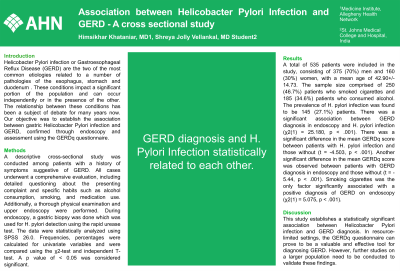Monday Poster Session
Category: Esophagus
P1854 - Association Between Helicobacter pylori Infection and GERD: A Cross Sectional Study
Monday, October 23, 2023
10:30 AM - 4:15 PM PT
Location: Exhibit Hall

Has Audio

Himsikhar Khataniar, MD
Allegheny General Hospital
Pittsburgh, PA
Presenting Author(s)
Himsikhar Khataniar, MD1, Shreya Jolly vellankal, 2, Bhabadev Goswami, MD3
1Allegheny General Hospital, Pittsburgh, PA; 2St. Johns Medical College and Hospital, Bengaluru, Karnataka, India; 3Dispur Hospitals, Guwahati, Assam, India
Introduction: Helicobacter Pylori infection or Gastroesophageal Reflux Disease (GERD) are the two of the most common etiologies related to a number of pathologies of the esophagus, stomach and duodenum . These conditions impact a significant portion of the population and can occur independently or in the presence of the other. The relationship between these conditions has been a subject of debate for many years now. Our objective was to establish the association between gastric Helicobacter Pylori infection and GERD, confirmed through endoscopy and assessment using the GERDq questionnaire.
Methods: A descriptive cross-sectional study was conducted among patients with a history of symptoms suggestive of GERD. All cases underwent a comprehensive evaluation, including detailed questioning about the presenting complaint and specific habits such as alcohol consumption, smoking, and medication use. Additionally, a thorough physical examination and upper endoscopy were performed. During endoscopy, a gastric biopsy was done which was used for H. pylori detection using the rapid urease test. The data were statistically analyzed using SPSS 26.0. Frequencies, percentages were calculated for univariate variables and were compared using the χ2-test and independent T-test. A p value of < 0.05 was considered significant.
Results: A total of 535 patients were included in the study, consisting of 375 (70%) men and 160 (30%) women, with a mean age of 42.90+/-14.73. The sample size comprised of 250 (46.7%) patients who smoked cigarettes and 185 (34.6%) patients who consumed alcohol. The prevalence of H. pylori infection was found to be 145 (27.1%) patients. There was a significant association between GERD diagnosis in endoscopy and H. pylori infection (χ2(1) = 25.180, p < .001). There was a significant difference in the mean GERDq score between patients with H. pylori infection and those without (t = -4.503, p < .001). Another significant difference in the mean GERDq score was observed between patients with GERD diagnosis in endoscopy and those without (t = -5.44, p < .001). Smoking cigarettes was the only factor significantly associated with a positive diagnosis of GERD on endoscopy (χ2(1) = 5.075, p < .001).
Discussion: This study establishes a statistically significant association between Helicobacter Pylori infection and GERD diagnosis. In resource-limited settings, the GERDq questionnaire can prove to be a valuable and effective tool for diagnosing GERD.
Disclosures:
Himsikhar Khataniar, MD1, Shreya Jolly vellankal, 2, Bhabadev Goswami, MD3. P1854 - Association Between Helicobacter pylori Infection and GERD: A Cross Sectional Study, ACG 2023 Annual Scientific Meeting Abstracts. Vancouver, BC, Canada: American College of Gastroenterology.
1Allegheny General Hospital, Pittsburgh, PA; 2St. Johns Medical College and Hospital, Bengaluru, Karnataka, India; 3Dispur Hospitals, Guwahati, Assam, India
Introduction: Helicobacter Pylori infection or Gastroesophageal Reflux Disease (GERD) are the two of the most common etiologies related to a number of pathologies of the esophagus, stomach and duodenum . These conditions impact a significant portion of the population and can occur independently or in the presence of the other. The relationship between these conditions has been a subject of debate for many years now. Our objective was to establish the association between gastric Helicobacter Pylori infection and GERD, confirmed through endoscopy and assessment using the GERDq questionnaire.
Methods: A descriptive cross-sectional study was conducted among patients with a history of symptoms suggestive of GERD. All cases underwent a comprehensive evaluation, including detailed questioning about the presenting complaint and specific habits such as alcohol consumption, smoking, and medication use. Additionally, a thorough physical examination and upper endoscopy were performed. During endoscopy, a gastric biopsy was done which was used for H. pylori detection using the rapid urease test. The data were statistically analyzed using SPSS 26.0. Frequencies, percentages were calculated for univariate variables and were compared using the χ2-test and independent T-test. A p value of < 0.05 was considered significant.
Results: A total of 535 patients were included in the study, consisting of 375 (70%) men and 160 (30%) women, with a mean age of 42.90+/-14.73. The sample size comprised of 250 (46.7%) patients who smoked cigarettes and 185 (34.6%) patients who consumed alcohol. The prevalence of H. pylori infection was found to be 145 (27.1%) patients. There was a significant association between GERD diagnosis in endoscopy and H. pylori infection (χ2(1) = 25.180, p < .001). There was a significant difference in the mean GERDq score between patients with H. pylori infection and those without (t = -4.503, p < .001). Another significant difference in the mean GERDq score was observed between patients with GERD diagnosis in endoscopy and those without (t = -5.44, p < .001). Smoking cigarettes was the only factor significantly associated with a positive diagnosis of GERD on endoscopy (χ2(1) = 5.075, p < .001).
Discussion: This study establishes a statistically significant association between Helicobacter Pylori infection and GERD diagnosis. In resource-limited settings, the GERDq questionnaire can prove to be a valuable and effective tool for diagnosing GERD.
Disclosures:
Himsikhar Khataniar indicated no relevant financial relationships.
Shreya Jolly vellankal indicated no relevant financial relationships.
Bhabadev Goswami indicated no relevant financial relationships.
Himsikhar Khataniar, MD1, Shreya Jolly vellankal, 2, Bhabadev Goswami, MD3. P1854 - Association Between Helicobacter pylori Infection and GERD: A Cross Sectional Study, ACG 2023 Annual Scientific Meeting Abstracts. Vancouver, BC, Canada: American College of Gastroenterology.
